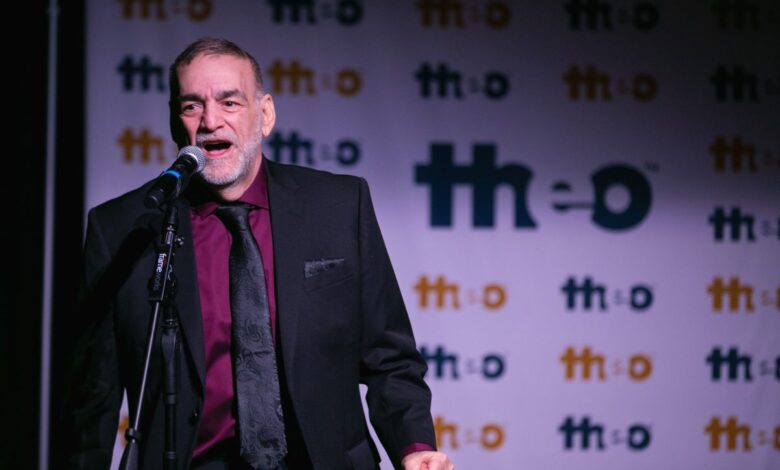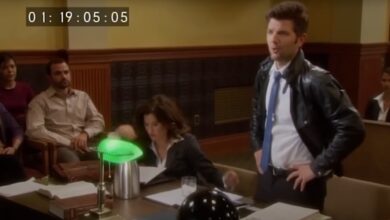Remembering Fred Anzevino and Shirley Mordine

Even in a timeline where loss feels overwhelming, the last couple of weeks have been tough for the theater and dance community, with the deaths of Fred Anzevino on April 28 and Shirley Mordine on May 2. (For those of us in journalism, the May 1 death of Michael Miner, former longtime editor and media columnist for the Reader, was also a punch to the gut.)
Anzevino, 67, was the founder and artistic director of the company now known as Theo, but founded in 1997 as Theo Ubique Theatre. (As their website notes, Theo is from the Greek for “divine gift” or Latin for “god,” and Ubique from the Latin for “everywhere” or “omnipresence.”) As the company increasingly specialized in intimate productions of musicals, they changed their moniker in 2004 to Theo Ubique Cabaret Theatre, and finally to Theo in 2022. Along the way, they created bighearted shows in tiny spaces—first at the old Heartland Cafe studio space in Rogers Park, then down the street at the No Exit Cafe space on Glenwood Avenue (the site is now home to Le Piano), and finally just over the border in Evanston at the Howard Street Theater. As of this writing, an official cause of death has not been released, but Anzevino had been open about living with HIV for many years, and several Theo colleagues noted that he had been in poor health in recent months.
But whatever his company was called and wherever they put down roots, Anzevino was at the heart of the vision, and his impact on musical theater artists in particular in the city is impossible to overstate.
Mordine, 89, founded the dance department at Columbia College Chicago and the college’s influential Dance Center. During her 30-year tenure at Columbia, which began in 1969, she instituted the center’s Dance Presenting Series in 1974, which brought contemporary dance artists from around the country to Chicago, often placing them in conversation and collaboration with local talent. (The Dance Center was originally housed in Uptown, but moved to Columbia’s South Loop campus in 2000.) She also ran her own troupe, Mordine & Company Dance Theater, from 1969-2019, and produced the first Dance Africa Chicago concert in 1991. She died from complications of Alzheimer’s disease.
As noted in a memoriam on the Dance Center website, Mordine said in 2017, “I always think of making dances in terms of what I observe in the world. ‘Every dance should be new, strange and beautiful.’ I don’t remember who told me that, but I like it.” The memoriam noted that Mordine’s “leadership transformed the Dance Center into a nationally recognized institution for dance education, performance, and public engagement.”
In a 2000 profile of Mordine for the Reader, Laura Molzahn noted that Mordine’s work evolved from pieces with a “theatrical bent” (Mordine had been a drama major at Mills College in Oakland, California) to dances that “started with a movement phrase or two and the story grew out of the process.” When asked on the occasion of the 50th anniversary of her own company what dance meant to her, Mordine said simply, “Dance saved my life.” She is survived by her former husband, Glenn Mordine, and children Alex, Ann, and Michael.

Though I have no evidence that the two ever worked together, their deaths so close together made me think about how both Anzevino and Mordine were key figures in creating space for new artists and work in their fields.
In Anzevino’s case, what he envisioned with Theo became a bedrock for a certain kind of musical production that hadn’t been done a lot in Chicago before. Companies like Drury Lane and Marriott (and later, Paramount in Aurora), alongside touring shows from Broadway in Chicago, provided opportunities for audiences to see larger-scale work. But Anzevino and his collaborators showed what could happen in a tiny room with emerging talents. In the No Exit days, the cast members doubled as servers as Theo became a new kind of dinner theater. (Patrons were able to add boxed dinners from various local restaurants to their experience at Howard Street Theater until the pandemic ended the practice.)
The company didn’t start off doing musicals: their first production in 1997 at the Heartland Studio was Italian modernist Ugo Betti’s drama Crime on Goat Island. But Anzevino’s tastes showed a flair for the populist (in the best sense of the word) early on; in 1999 and then again in 2000, Theo produced Anzevino’s adaptation of Carl Sandburg’s 1936 sweeping poem, The People, Yes, which Reader critic Mary Shen Barnidge described as “an eloquent but never mawkish testimonial to the enduring American character.” The first show I remember seeing with Theo at the No Exit was a 2004 performance created from a book-length work by another Illinois poet—Spoon River Anthology by Edgar Lee Masters—which included original bluegrass and folk music.
Anzevino, who was born in Providence, Rhode Island, was a former touring musical performer himself before landing in Chicago. When he brought his love of musicals to Theo’s mission, the company really found its voice, receiving, by my count, over 200 Non-Equity Jeff Award nominations and 73 wins. (Anzevino himself won six awards for directing.)
But in reading over the tributes on social media and talking to the people who worked closely with him over the years, it seems clear that the big prize for Anzevino was providing opportunities for others.
Christopher Pazdernik, who joined Theo as producing director in 2021 and departed recently to become managing director for Season of Concern, tells me he first became aware of Theo as a senior in theater at Elmhurst College, where he stumbled upon a Reader review of Anzevino’s 2007 revival of John Kander and Fred Ebb’s Cabaret, staged at No Exit. He coaxed a group of his classmates to come to the city to see it. “When we got there and we walked in, I felt like I’d walked into the Kit Kat Club,” Pazdernik recalls. What Pazdernik calls the “stacked and a half cast” (including Jeremy Trager, Maggie Portman, Jenny Lamb, and Bethany Thomas) blew him away. Pazdernik didn’t meet Anzevino that night, but eventually he moved to the city, wrangled an introduction, and ended up stage managing Theo’s 2009 production of Dale Wasserman’s Man of La Mancha (“the beginning and end of my professional stage management career,” notes Pazdernik).
Anzevino, who directed most of the productions in the early years, began bringing on new talents over time. Pazdernik ended up directing the company’s revival of Stephen Schwartz’s Godspell in 2022, but he and Anzevino originally got together to talk about it in 2019. “I had coffee at [Rogers Park coffee house] Charmers with Fred, and it ended up being like a two-hour conversation about what we felt about the theater and what we wanted for the show.” (I live down the street from Charmers and ran into Fred there myself from time to time, where he would graciously ask my thoughts about shows he was thinking of producing, though I do not possess Anzevino’s apparently encyclopedic knowledge of musicals.)
The pandemic delayed Pazdernik’s debut as a director for Theo, but he notes that “It was through the process of casting and hiring and all of that stuff that Fred and I really developed a close working relationship.”
Coming out of the pandemic, Pazdernik notes that Anzevino was willing to work on expanding diversity initiatives. “We partnered with a group called Theatre Advocacy Project who are kind of like an external HR for small arts or theater nonprofits specifically. I think what I really just admired most about him was his willingness to learn new ways of doing things—new terms, new ways of rehearsing a show, or interacting with people. You don’t often find people at that stage in life who are so open, who have such open hearts to understanding just new things—social justice and identity and all of the things that really came to the forefront during the pandemic.”
Pazdernik also points out that the company began devoting more resources to developing new musical works, such as 2022’s Refuge by Satya Jnani Chávez and Andrew Rosendorf, which Reader critic Kelly Kleiman described as “less a play than a ritual with music enacting displacement, loss, and fear” in telling the story of a Central American woman’s efforts to migrate to the U.S., and 2023’s Asian American musical comedy about a family’s cannabis business, Baked! (created by Deepak Kumar and Jord Liu).
Longtime Chicago choreographer and director Brenda Didier, who was collaborating with Anzevino on the company’s upcoming production of Diana, about the late princess, also tells me that she first met Anzevino at that production of Cabaret. He told her, “Someday, darling, we’ll work together.” The first show she choreographed for Theo was their 2009 revival of Andrew Lloyd Webber and Tim Rice’s Evita. Didier was hired in fall of 2008. Before rehearsals began, she was diagnosed with early stage breast cancer.
“I went to his house [in January] and we had the script open. I go, ‘I have to share something with you,’” recalls Didier. “I told him, I held his hand, and he said, ‘OK, can you do the show? You think you can do it?’ I said, ‘Yeah, my chemo starts in February, so why don’t I knock out the three dance numbers before then?’ He said, ‘OK.’ And we went to work, and he didn’t bat an eye.” Didier notes that Anzevino told her he had lost his own mother to breast cancer when he was 27. “He just said, ‘I don’t know what it is, Brenda, but I feel like I’m supposed to meet you now in my life.’ That was a very special bonding moment for us. And ever since then, he was like an older brother to me.”
Anzevino’s declining health had caused him to step back from being as active in the day-to-day management of Theo (the last production he staged for the company was Bertolt Brecht and Kurt Weill’s The Threepenny Opera in March 2023). Didier knew going into rehearsals for Diana that it was taking a toll. The two hadn’t worked together for several years, as Didier had become increasingly in demand at larger theaters. But Anzevino talked to her at her production of Jersey Boys at Mercury Theater Chicago in summer 2024 to see if she was available to come home to Theo. “He told me, ‘I’m doing Diana.’ I said, ‘Diana Ross?’ He goes, ‘No, Diana, the princess of Wales.’”
Diana
5/23-7/6: previews 5/23-5/30, Fri–Sat 7:30 PM, Sun 6 PM; regular run 5/31-7/6, Thu–Sat 7:30 PM, Sun 6 PM; no performances 6/19 or 7/4; Howard Street Theater, 721 Howard, Evanston, 773-939-4101, theo-u.com, $30-$60
Joe DiPietro and David Bryan’s musical didn’t get great reviews in its 2021 New York outing. But Didier thinks there was a special connection for Anzevino, as someone living with HIV, to Diana, who visited with and embraced people with AIDS at hospitals at a time when many others avoided all contact with AIDS patients. She also laughs as she tells me one very specific note Anzevino gave her for Prince Charles: “He should dance like a bad white midwestern man at a wedding.”
Didier says, “He called [Theo] his house, you know? ‘This is my home. This isn’t my theater, it’s my home. The Holy Spirit lives in my home. It’s a temple for people to connect and communicate.’”

Theo board member Ann Rainey, who also served for 34 years as alderperson of south Evanston’s Eighth Ward, had been working to find a resident company for the Howard Street Theater before meeting Anzevino and Theo. “The minute they presented themselves, I fell in love with them immediately,” she says.
Architect Carol Ross Barney, whose resume includes big-ticket designs like the Chicago Riverwalk and the Searle Visitor Center at Lincoln Park Zoo, came in with the lowest bid to remake the venue, which had been a church before the city of Evanston took it over.
Says Rainey, “We sat down in a very fancy office at city hall with Fred and his team, and some board members from Theo, who I had never seen before in my life. And she started explaining her vision for the new space, and Fred leaned over to her and said, ‘Now look, Ms. Barney, we had a very intimate space on Glenwood, and we wanna keep it that way.’ And she leaned over to him and she said, ‘Fred, I have been a sponsor of Theo since the day it started. I have never missed an opening night.’ And he sat back and he said, ‘You’re kidding. Sorry, I didn’t know.’ Sure enough, we checked her out. And she had never missed an opening night.” Barney’s vision and Anzevino’s meshed well: the Howard Street venue, which Theo opened with a 2018 production of Terrence McNally and David Yazbek’s The Full Monty, allows for flexible and at times immersive staging, with cabaret tables available for those who want to be closest to the action and an inviting bar by the entrance.
Even people who never fully got the chance to work with Fred were influenced by him. Harmony France, the cofounder of Firebrand Theatre, was on the cusp of making her Theo debut in 2020 with Grey Gardens (created by Doug Wright, Scott Frankel, and Michael Korie), but the pandemic shutdown hit just as they were supposed to open. France also met Anzevino at Cabaret because a good friend of hers was in the cast. In a Facebook post, she notes, “That was one of my first exposures to storefront theatre, and I was absolutely hooked. While others dreamed of working at Marriott or, better yet, Broadway, I dreamed of working at Theo, this unbelievably magical place that Fred had curated.”
As a fellow producer, France noted that Anzevino gave invaluable advice to her as she started Firebrand. As for Anzevino as a director, she wrote on Facebook, “Fred Anzevino does not direct in feet; he directs in inches. He directs in micromovements and expressions and emotions, and truth. Having worked with both, he directs like David Cromer, and that is the highest compliment I can give to both men.”
Jeremy Ramey, who served as musical director for dozens of Theo shows before leaving the company under what he described in a Facebook post as “not good circumstances,” nonetheless went on to write, “Thank you, Fred, for the good times. Thank you for the opportunities. Thank you for the experience I got doing 42 shows. You’re a selfish asshole and I loved you very much.”
In the years since Anzevino formed Theo, many other companies have jumped into the intimate-musicals world. Some, like BoHo and Underscore, are no longer producing, but Didier notes that BoHo cofounders Stephen Genovese and Thomas Samorian always credited Anzevino for helping inspire their decision to produce chamber musicals. Paramount’s 165-seat Copley Theatre, while much larger than Theo, still provides a more intimate alternative to the company’s huge main auditorium. And dozens of artists have found their voices because of the intimate little temple to music and art that Anzevino built. He is survived by a sister, Joann Benedetti.
https://chicagoreader.com/wp-content/uploads/2025/05/Fred-Anzevino_2022_Jay-Towns-Photography-e1746808565608.jpeg
2025-05-09 12:19:55










